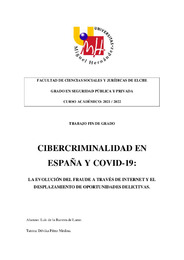Por favor, use este identificador para citar o enlazar este ítem:
https://hdl.handle.net/11000/28320Registro completo de metadatos
| Campo DC | Valor | Lengua/Idioma |
|---|---|---|
| dc.contributor.advisor | Pérez Medina, Dévika | - |
| dc.contributor.author | De la Barrera de Lamo, Luis | - |
| dc.contributor.other | Departamentos de la UMH::Ciencia Jurídica | es_ES |
| dc.date.accessioned | 2022-11-10T07:52:45Z | - |
| dc.date.available | 2022-11-10T07:52:45Z | - |
| dc.date.created | 2022-06-11 | - |
| dc.identifier.uri | https://hdl.handle.net/11000/28320 | - |
| dc.description.abstract | El fraude a través de Internet y su evolución durante la pandemia por la COVID-19 merece especial análisis al haber aumentado de forma estrepitosa, siendo esta la conducta de mayor incidencia recogida en los informes de cibercriminalidad emitidos por las diferentes instituciones. El desarrollo masivo de las Tecnologías de Información y Comunicación (TIC), la infinidad de servicios que ofrece Internet, junto con las medidas de confinamiento adoptadas por los poderes públicos, fueron factores que influyeron a los ciudadanos a utilizar Internet de forma desmesurada, teniendo por tanto que adecuar sus hábitos a las nuevas circunstancias y de alguna manera continuar con su vida normal. Por consiguiente, multitud de ciudadanos se sumaron al uso de Internet y trasladaron sus actividades cotidianas al espacio virtual, lo que implicó el incremento de riesgos en el ciberespacio. Por lo expuesto, el presente trabajo pretende abordar la evolución del fraude a través de Internet y analizar su incidencia durante los tiempos de pandemia, mediante la revisión de diversos estudios relacionados con el fenómeno indicado, con el objeto de aproximarse a la realidad y generar conocimiento para futuros estudios. Tras el análisis realizado, se puede llegar a la conclusión que existe una correlación entre el aumento del fraude mediante dispositivos informáticos con el uso de Internet, al igual que se percibe un cambio de actividades cotidianas como consecuencia de las medidas de confinamiento, hecho que provocó el aumento de riesgos en el “ciberespacio” y, por consiguiente, un incremento de oportunidades ciberdelictivas. | es_ES |
| dc.description.abstract | Internet fraud and its evolution during the COVID-19 pandemic deserves special analysis as it has increased dramatically, being the behavior with the highest incidence reported in the cybercrime reports issued by the different institutions. The massive development of Information and Communication Technologies (ICT), the infinity of services offered by the Internet, together with the confinement measures adopted by the public authorities, were factors that influenced citizens to use the Internet in a disproportionate way, thus having to adapt their habits to the new circumstances and somehow continue with their normal life. Consequently, a multitude of citizens joined the use of the Internet and transferred their daily activities to the virtual space, which implied the increase of risks in cyberspace. Therefore, this paper aims to address the evolution of fraud through the Internet and analyze its incidence during the pandemic times, by reviewing various studies related to the phenomenon indicated, in order to approach the reality and generate knowledge for future studies. After the analysis carried out, it can be concluded that there is a correlation between the increase in fraud through computer devices and the use of the Internet, as well as a change in daily activities as a consequence of the confinement measures, which led to an increase in risks in "cyberspace" and, consequently, an increase in cybercrime opportunities. | es_ES |
| dc.format | application/pdf | es_ES |
| dc.format.extent | 63 | es_ES |
| dc.language.iso | spa | es_ES |
| dc.publisher | Universidad Miguel Hernández de Elche | es_ES |
| dc.rights | info:eu-repo/semantics/openAccess | es_ES |
| dc.rights | Attribution-NonCommercial-NoDerivatives 4.0 Internacional | * |
| dc.rights.uri | http://creativecommons.org/licenses/by-nc-nd/4.0/ | * |
| dc.subject | cibercriminalidad | es_ES |
| dc.subject | COVID-19 | es_ES |
| dc.subject | fraude online | es_ES |
| dc.subject | estafa informática | es_ES |
| dc.subject | desplazamiento de oportunidades delictivas | es_ES |
| dc.subject.other | CDU::3 - Ciencias sociales::34 - Derecho::343 - Derecho penal. Delitos | es_ES |
| dc.title | Cibercriminalidad en España y Covid-19: la evolución del fraude a través de internet y el desplazamiento de oportunidades delictivas. | es_ES |
| dc.type | info:eu-repo/semantics/bachelorThesis | es_ES |

Ver/Abrir:
SEPP_TFG_DE LA BARRERA_DE LAMO_LUIS.pdf
761,23 kB
Adobe PDF
Compartir:
 La licencia se describe como: Atribución-NonComercial-NoDerivada 4.0 Internacional.
La licencia se describe como: Atribución-NonComercial-NoDerivada 4.0 Internacional.
.png)